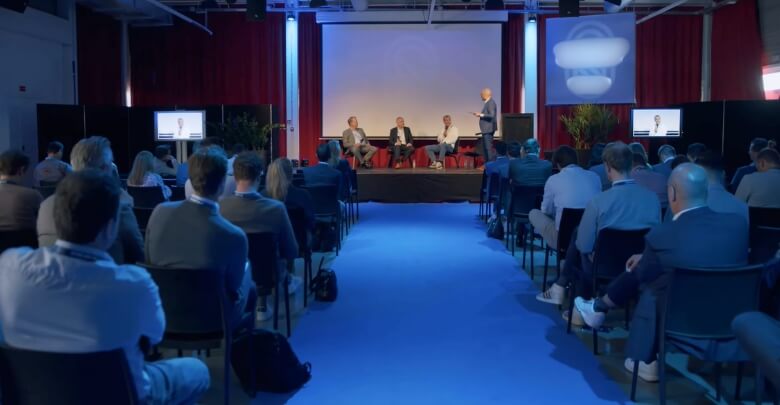When we gather for discussions, often in professional or academic settings, we call it a “Conference.” Have you ever wondered why is it called a Conference? The origin of the term might surprise you. “Conference” isn’t just a word thrown around to describe meetings.
At its heart, it stems from the word “confer,” which means to compare views or take counsel. Drawing from this, the purpose of conferences becomes clear, they are spaces designed for deliberation and exchange of ideas.
Would you like to learn more about “conferences” and their significance? By reading this article, you’ll learn why these events are named as such and how their role has changed over time. Learn why these events are named as they are and how their roles have evolved over time.
Historical Overview of a Conference
A conference brings together people from various fields to exchange knowledge and collaborate on topics of mutual interest. These events play a critical role in fostering communication, innovation, and professional development across industries. Conferences can range from small, specialized meetings to large international events, each designed to achieve specific objectives.

The history of conferences dates back to ancient times when leaders and scholars met to discuss governance, trade, and societal issues. These early gatherings were the foundation for the more structured and formal conferences we know today. Over the centuries, as societies and industries developed, the nature of conferences also changed, becoming more specialized and targeted.
During the Victorian period, academic societies organized regular meetings to discuss scientific advancements, philosophy, and the arts, marking the origin of conference as we know them today. These early conferences set the stage for modern-day events, which now span various industries and fields. They have become essential for networking, education, and driving innovation.
Conferences continue to play an important role in professional and academic life. They serve as platforms for launching new ideas, products, and research, and they facilitate global collaboration. As conferences develop, they embrace new technologies and formats, ensuring they remain relevant and impactful in an increasingly connected world.
Why is It Called a Conference?
The term “conference” is rooted in the idea of bringing people together to discuss and deliberate on important matters. This concept has been central to conferences for centuries, emphasizing communication and collaboration. Here are some reasons why it’s called a conference and what it means.

The Latin Origin
In Latin, the word “conference” means “to bring together” or “to consult.” This origin highlights the essence of conferences, which are events in which people gather to exchange ideas, discuss, and make decisions.
Early Usage in Religious and Political Contexts
Historically, the term “conference” was used to describe formal gatherings in religious and political settings. Leaders would come together to confer on important matters, and the term naturally developed to describe any formal meeting or assembly where discussions and collaborations were central.
Focus on Discussion and Communication
The name “conference” refers to the act of conferring—engaging in discussion or consultation. Unlike other gatherings, a conference specifically involves a focus on dialogue, where participants exchange ideas and insights. This focus on communication is at the heart of why it’s called a conference.
The Role of Collective Decision-Making
Conferences are often organized to facilitate collective decision-making. The term “conference” captures this collaborative aspect, where various stakeholders come together to reach agreements or plan future actions. The name reflects the purpose of these meetings as platforms for joint deliberation.
Conferences as Platforms for Exchange
The term also signifies a space for the exchange of ideas, knowledge, and perspectives. Whether in academic, professional, or social contexts, conferences are designed to foster the exchange of information among participants. This exchange is a key reason why these gatherings are called conferences.
The Meaning of the Term in Modern Times
Conferences have expanded in modern times to feature both academic sessions and industry meetings. Despite this progress, the core idea remains the same: a conference is a gathering where people confer, share, and learn from one another.
The Continuing Efficacy of the Term
The term “conference” has stood the test of time because it describes these gatherings accurately. It represents the idea of bringing people together for a common purpose, centered on discussion and consultation. This relevance is why the term is widely used today.
Taking part in meaningful discussions is the very purpose of conferences, which is why they are called conferences. As a result, conferences continue to serve as essential platforms for collaboration and communication today, defining how we think about and participate in them.
Different Types of Conferences
There are many types of conferences, each designed to meet specific objectives and audiences. Knowing the different types of conferences can help you maximize your experience, whether you’re networking, learning new skills, or keeping up with industry trends. Exploring the range of options available is key to selecting the right one for your needs.
Industry Conferences
The focus of industry conferences is usually on a specific area, such as technology, healthcare, or finance. Professionals gather at these events to discuss trends, share knowledge, and network. A keynote address, a panel discussion, and workshops provide participants with an overview of the latest industry developments and opportunities for professional development.
Academic Conferences
Scholars, researchers, and students present and discuss their work at academic conferences. These events typically feature paper presentations, poster sessions, and keynote speeches, allowing participants to share their findings and receive feedback from their peers. They play a crucial role in advancing knowledge and supporting collaboration within academic communities.
Business Conferences
A business conference brings together professionals from different industries to discuss business strategies, best practices, and emerging trends. Workshops, networking sessions, and panel discussions are often included in these events. This helps attendees gain valuable insights into the business world and drive career and industry growth.
Professional Development Conferences
Professional development conferences are focused on helping individuals enhance their skills and knowledge in their respective fields. These events often feature workshops, training sessions, and seminars that provide practical, hands-on learning experiences. The purpose of professional conferences is to support professionals in advancing their careers, gaining certifications, or staying updated with the latest industry standards.
Attending the right conference requires understanding the different types and purposes of conferences. Whether you’re looking to network, learn, or showcase your products, each type of conference offers unique opportunities for growth and connection in your professional growth.
Who Attends Conferences?
A conference is a vibrant gathering that attracts a variety of groups. These events serve as hubs for knowledge, networking, and innovation, bringing together diverse attendees who contribute to the dynamic exchange of ideas and foster collaboration.
- Researchers and Academics: Universities and institutions send their best minds to academic conferences. These academicians present studies, findings, and theoretical advancements. By participating, they contribute to a deeper understanding of discourse and develop their personal growth.
- Industry Professionals: Business conferences are bustling with experts from various fields. These professionals exchange industry insights, trends, and best practices. They attend to improve their skills, network, and stay updated.
- Entrepreneurs and Business Owners: Dynamic and forward-thinking, entrepreneurs seek opportunities everywhere. Conferences provide them with networking avenues and potential collaboration spaces. They’re always on the lookout for the next big idea.
- Students and Aspirants: Wanting to learn and make their mark, students often attend relevant conferences. They seek guidance, inspiration, and potential career opportunities. Such events offer them a broader perspective on their chosen fields.
- Product Exhibitors: Trade and tech conferences often feature exhibitors showcasing innovations. They present their products or services, aiming to impress potential clients. Such platforms are vital for marketing and business growth.
- Public and Private Investors: Looking for promising ventures and innovative ideas, investors frequent various conferences. They gauge market potential, analyze risks, and explore investment avenues. Their presence often signifies industry health and growth potential.
- Activists and Supporters: Humanitarian, environmental, and social conferences attract passionate activists. They stand up for causes, share experiences, and strategize for impact. Their participation ensures change voices are always heard.
Conferences bring together a wide range of participants, each contributing to the exchange of ideas and growth of different fields. The diverse mix of attendees ensures that conferences remain vital platforms for innovation, collaboration, and progress.
Benefits of Attending a Conference
A conference offers much more than just a chance to meet like-minded professionals. These events are rich with opportunities that can significantly impact your personal and professional journey. Below, we explore the various benefits of participating.
Knowledge Enhancement
The purpose of conferences is to bring together experts, researchers, and leaders under one roof. Attendees get insights, trends, and research findings firsthand. Such environments encourage continuous learning and skill refinement.
Networking Opportunities
Beyond the scheduled sessions, conferences are networking goldmines. Professionals meet peers, potential collaborators, and industry leaders. These connections can open doors to uncharted opportunities, highlighting the significant role of conference in developing valuable professional relationships.
Inspiration and Motivation
Hearing success stories and innovations can be profoundly inspiring. Attendees leave with renewed enthusiasm and a drive to innovate. Such environments catalyze creativity and ambition.
Skill Development
Many conferences feature workshops and hands-on sessions. Participants get to refine existing skills and acquire new ones. This practical approach facilitates professional growth.
Collaborative Ventures
The relaxed environment of conferences can lead to significant collaborations. Professionals identify synergies and explore partnership avenues. These ventures can lead to significant projects and initiatives.
Conferences provide a wealth of opportunities that can influence both your career and personal growth. The experiences and connections gained from these events often have lasting effects, making them a valuable part of any professional career.
Frequently Asked Questions
Conferences are essential to professional and academic life, bringing people together to discuss and collaborate on important matters. Below, we’ve answered some common questions to help you better understand why these gatherings are called conferences and their significance.
How Does a Conference Differ from a Workshop?
While both conferences and workshops are formal gatherings, a conference typically covers a broader range of topics and involves larger groups of participants. Workshops, on the other hand, are generally focused on a specific subject and involve expert presentations. The term “conference” encompasses a wide variety of discussions and interactions.
Why is Ideas Exchange Crucial in a Conference?
A conference is important for promoting innovation, learning, and collaboration because ideas are exchanged. Conferences provide a platform where diverse perspectives come together, allowing participants to share knowledge, challenge existing ideas, and develop new approaches to common issues. This interaction is a key reason conferences are held.
How Did Conferences Originate as Formal Gatherings?
Early conferences were formal gatherings where scholars and leaders discussed governance, trade, and societal issues. These early assemblies were the precursors to the modern conferences we know today, turning into structured events focused on discussion, consultation, and decision-making across various fields.
How Have Modern Conferences Adapted to New Technologies?
Modern conferences have adapted to new technologies by utilizing virtual platforms, live streaming, and interactive tools to improve participation and accessibility. These advancements allow people from around the world to engage in discussions and share ideas, making conferences more inclusive and effective in achieving their goals.
What Role Does Consultation Play in a Conference?
The central aspect of any conference is consultation. During these gatherings, participants consult with each other to gain insights, make informed decisions, and develop strategies. This collaborative approach ensures that conference outcomes are well-rounded and consider multiple viewpoints, making the event effective and impactful.
Final Thoughts
Conferring is the name itself that perfectly describes the purpose of conferences: to promote knowledge exchange and professional growth. By engaging in discussions, attendees utilize collective expertise to promote innovation and make informed decisions, answering the question “Why is it called a conference?”
Don’t forget to come up with a strategy when you prepare to attend your next conference. Set clear goals for what you hope to achieve, whether it’s gaining new insight, expanding your network, or finding inspiration. Engage actively in every session and follow up with new contacts. Best wishes as you begin this exciting experience.






